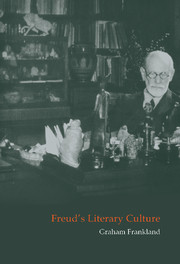Book contents
- Frontmatter
- Contents
- Preface
- Acknowledgements
- Introduction
- Chapter One The unconscious of psychoanalysis: Freud's literary allusions
- Chapter Two A sublime ambivalence: Freud as literary critic
- Chapter Three The literary-critical paradigm: sources of Freud's hermeneutic
- Chapter Four The frustrated Dichter: literary qualities of Freud's text
- Conclusion
- Notes
- Bibliography
- Index
Chapter Three - The literary-critical paradigm: sources of Freud's hermeneutic
Published online by Cambridge University Press: 22 September 2009
- Frontmatter
- Contents
- Preface
- Acknowledgements
- Introduction
- Chapter One The unconscious of psychoanalysis: Freud's literary allusions
- Chapter Two A sublime ambivalence: Freud as literary critic
- Chapter Three The literary-critical paradigm: sources of Freud's hermeneutic
- Chapter Four The frustrated Dichter: literary qualities of Freud's text
- Conclusion
- Notes
- Bibliography
- Index
Summary
GRADIVA AND THE RETURN OF THE REPRESSED
Two paradoxes regarding the relevance of Freud's theories to the practice of literary criticism are often noted by critics. The first is that, although he considered himself to be a natural scientist, indulging only occasionally in literary criticism as an amateur, his pretension to scientific status has been widely discredited, whilst his inuence has saturated most spheres of literary criticism. The second is that literary critics are almost invariably more interested in texts in which Freud does not directly address literature. The Interpretation of Dreams and Jokes and their Relation to the Unconscious are most popular with literary critics, but Bloom, for example, is equally interested in Inhibitions, Symptoms and Anxiety, whilst Peter Brooks looks to Beyond the Pleasure Principle for specifically literary insights. This could be explained most easily by pointing to the correspondences between the ‘primary processes’ of unconscious thought and the stylistic features of literary writing. However, I wish to shed light on these paradoxes from a rather different angle. It seems to me that the effects of psychoanalysis were felt most forcefully in the literary sphere because the roots of Freud's ‘scientific’ practice were themselves literary in a very specific way.
As we have seen, Freud rarely allows himself to indulge in literary criticism for its own sake.
- Type
- Chapter
- Information
- Freud's Literary Culture , pp. 117 - 161Publisher: Cambridge University PressPrint publication year: 2000



